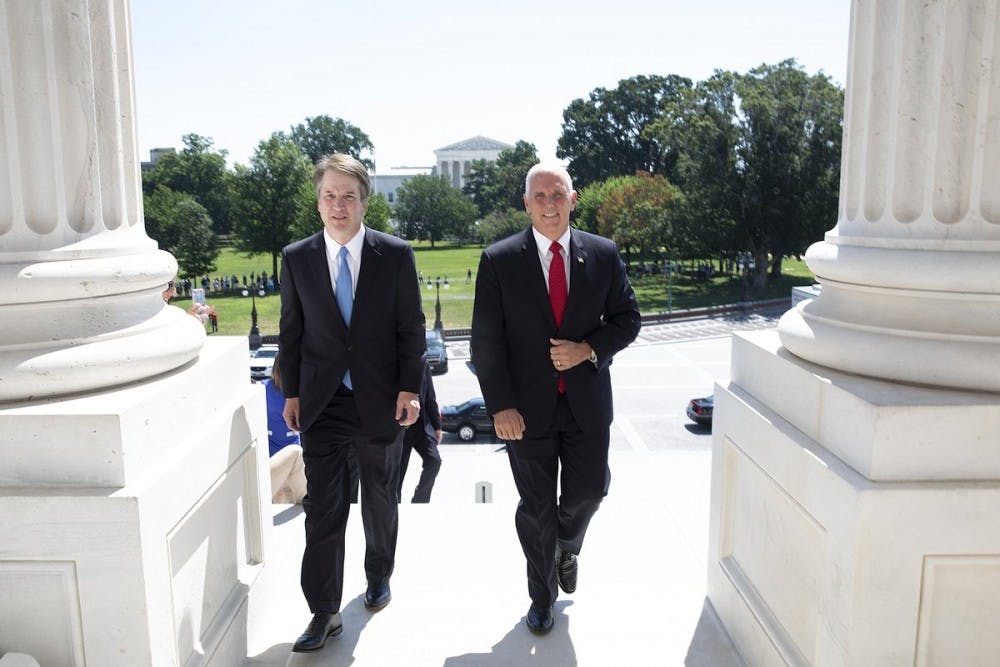The Senate voted earlier this month to confirm Judge Brett Kavanaugh, thus marking the end of a fiercely contentious Supreme Court confirmation process. The votes were cast largely along party lines. In the aftermath of his confirmation, protestors charged past a police line to pound on the doors of the Supreme Court, demonstrating their opposition Kavanaugh’s confirmation. With all the strong emotions that resulted from this confirmation, I want to address the fundamental question at the root of it all — was the Senate wrong to confirm Brett Kavanaugh to the Supreme Court?
Given that Kavanaugh attended Yale Law School, clerked for Anthony Kennedy, taught at both Yale and Harvard Law Schools and served on the United States Court of Appeals for the D.C. Circuit for over 12 years, it can hardly be argued that he is not qualified to be on the Supreme Court. Furthermore, while Kavanaugh is certainly conservative, none of the measures that FiveThirtyEight used to measure his judicial ideology put him outside the mainstream of legal thought. As a result of his qualifications and ideology, he seemed to be a shoo-in for confirmation. That is, until the allegations of sexual assault against Kavanaugh by Prof. Christine Blasey Ford became public.
In a confidential letter sent to Sen. Dianne Feinstein (D-Calif.), Ford asserted that when she and Kavanaugh were in high school together, Kavanaugh forcibly pushed her onto a bed, grinded his body against hers, tried to take her clothes off and covered her mouth so she could not scream. This letter, when it was eventually leaked to the public, led to now-famous hearings in which Ford and Kavanaugh testified about the allegations. In her testimony, Ford spoke about what happened to her, what she thought and felt at the time and how she was “100 percent certain” that it was Brett Kavanaugh who had assaulted her. Kavanaugh, in his testimony, denied all accusations and painted the allegations against him as, “a long series of false last-minute smears designed to scare me and drive me out of the process.” After the hearings, a group of undecided senators, led by Sen. Jeff Flake (R-Ariz.), demanded an FBI investigation into the allegations. The demands were fulfilled, and the summary of the investigation’s findings has been released.
The first thing I want to note about these allegations is that if they are true, they are certainly disqualifying. Nobody who has done what Ford alleges should be on the Supreme Court, and I believe this is true even after his confirmation — if evidence that sufficiently shows he is guilty of the allegation comes up, he must be impeached, convicted and replaced.
Another important note is that Kavanaugh must be presumed innocent until otherwise proven guilty. One may argue that because confirmation hearing was not a trial, the presumption of innocence was not guaranteed by the Constitution and, therefore, senators should have sided with the more believable or credible witness. While it is true that the presumption of innocence was not constitutionally guaranteed, it does not follow that the presumption should not be granted. The reason why the presumption of innocence is given to the accused in trials is because it helps ensure a fair adjudicatory proceeding, not just because the Constitution says we must. As such, the presumption of innocence can and should exist outside of the justice system.
While I saw Ford’s testimony as more believable than Kavanaugh’s, I have not seen evidence that would supercede the presumption of innocence. Unfortunately, this may be more of a function of how the hearings and subsequent investigation were done than anything. Senate Republicans were clearly more interested in expediency than truth — they wanted to do the least amount possible while still getting the necessary votes. From refusing to release 100,000 pages of records of Kavanaugh’s time in the George W. Bush White House, to declining to subpoena alleged eyewitness Mark Judge, to rushing an investigation that some lawmakers have said is incomplete and limited in scope, Senate Republicans have shown complete apathy toward the truth.
In spite of the lack of evidence for the allegations, Kavanaugh’s performance during the hearings showed a temperament that does not deserve to be on the Court. From the beginning he was angry — which can hardly be unexpected from someone who believes he’s been wrongly accused — but it went beyond just anger. He rudely talked over and back to senators who were trying to find out whether the accusations are true. Furthermore, he said that the allegations were “revenge on behalf of the Clintons” and gave misleading answers to questions. All in all, he acted like a bitter partisan with a questionable regard for the truth — the exact opposite of someone who should be on the Court. This brings me back to the fundamental question of this column, was the Senate wrong to confirm Kavanaugh? Absolutely.
Gavin Scott is a Senior Associate Opinion Editor for The Cavalier Daily. He can be reached at g.scott@cavalierdaily.com.







